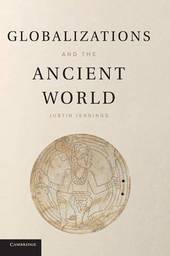
|
Globalizations and the Ancient World
Hardback
Main Details
| Title |
Globalizations and the Ancient World
|
| Authors and Contributors |
By (author) Justin Jennings
|
| Physical Properties |
| Format:Hardback | | Pages:216 | | Dimensions(mm): Height 254,Width 178 |
|
| Category/Genre | Prehistoric archaeology |
|---|
| ISBN/Barcode |
9780521760775
|
| Classifications | Dewey:930 |
|---|
| Audience | | Postgraduate, Research & Scholarly | |
|---|
| Illustrations |
3 Tables, unspecified; 4 Maps; 3 Halftones, unspecified; 8 Line drawings, unspecified
|
|
Publishing Details |
| Publisher |
Cambridge University Press
|
| Imprint |
Cambridge University Press
|
| Publication Date |
8 November 2010 |
| Publication Country |
United Kingdom
|
Description
In this book, Justin Jennings argues that globalization is not just a phenomenon limited to modern times. Instead he contends that the globalization of today is just the latest in a series of globalizing movements in human history. Using the Uruk, Mississippian, and Wari civilizations as case studies, Jennings examines how the growth of the world's first great cities radically transformed their respective areas. The cities required unprecedented exchange networks, creating long-distance flows of ideas, people, and goods. These flows created cascades of interregional interaction that eroded local behavioral norms and social structures. New, hybrid cultures emerged within these globalized regions. Although these networks did not span the whole globe, people in these areas developed globalized cultures as they interacted with one another. Jennings explores how understanding globalization as a recurring event can help in the understanding of both the past and the present.
Author Biography
Justin Jennings is Associate Curator of New World Archaeology at the Royal Ontario Museum and Assistant Professor of Anthropology at the University of Toronto. He writes widely on archaeology for both scholarly and general audiences and recently edited Drink, Power, and Society in the Andes and Beyond Wari Walls.
Reviews'Jennings provides a lucid argument supported by archaeological data and a compelling case for a unified approach that eliminates artificial distinctions between past and present. This book would work well in advanced undergraduate and graduate classes on theory and others that deal with comparative analysis more generally.' American Journal of Archaeology 'Jennings's work is carefully constructed, compactly argued, and quite convincing. As such, it is indispensable reading for anyone interested in studying globalization as [a] timeless human phenomenon. Essential.' Choice
|